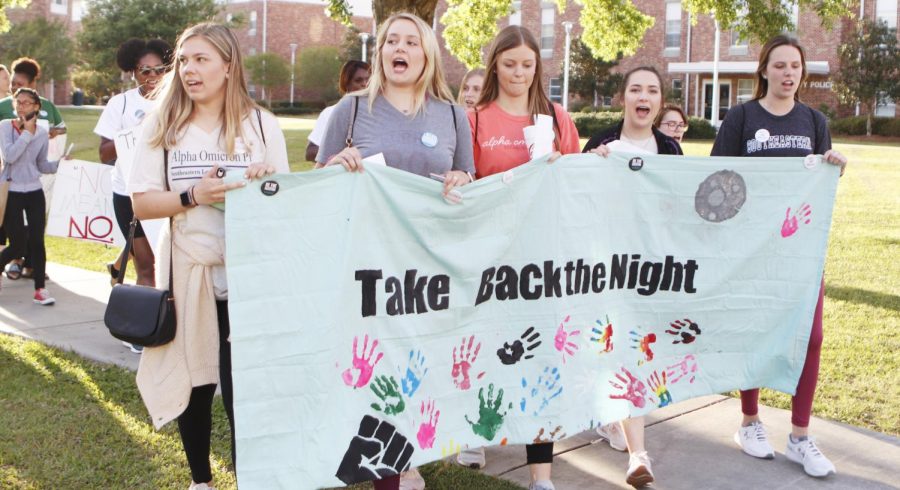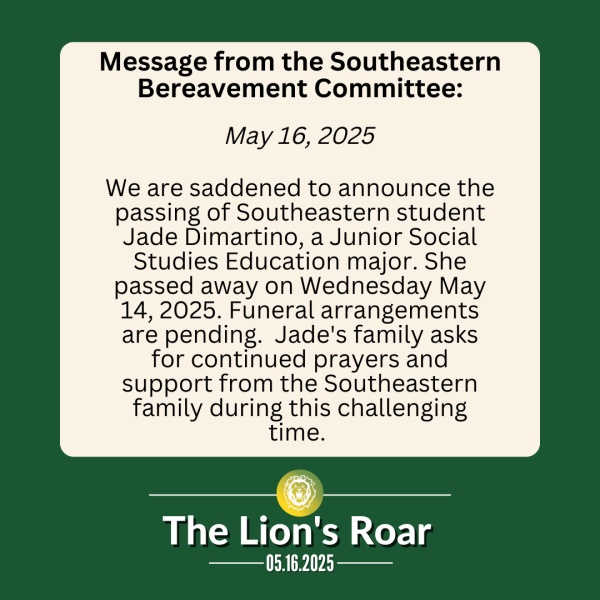Sexual Harassment: addressing the issue
Zachary Araki/The Lion’s Roar
For “Take Back the Night Rally,” students marched with posters around campus and chanted to raise awareness about sexual assault. Scheduled during Sexual Assault Awareness Month, the march is part of a national campaign to engage students and educate them on the issue.
Identifying what constitutes sexual harassment can be critical to confronting it.
According to the National Sexual Violence Resource Center, one in five women will be raped at some point in their lives. The source also cites that 20-25% of college women and 15% of college men are victims of forced sex during their time in college. However, due to the difficulty to define the term, confusion can occur to what entails sexual harassment and when to report it.
Patrick Gipson, police lieutenant, shared that it is up to the victim’s discernment on whether the harassment had a sexual undertone or not.
“Usually, if somebody is doing or saying something that makes you feel uncomfortable, then it’s probably something that needs to stop,” said Gipson, “But all forms of harassment aren’t sexual harassment so it’s gonna often be up to the victim to decide whether they’re being harassed or whether the behavior is inappropriate.”
Title IX of the university sexual misconduct policy states that sexual harassment is unwelcomed conduct of a sexual nature, especially when such conduct interferes with a person’s employment or education.
The policy states, “Such conduct has the purpose or effect of unreasonably interfering with a person’s employment or education, or creating an intimidating, hostile, or offensive employment or educational environment.”
Because of this definition, examples of university sexual harassment can vary from posting tacky cartoons in public places to offering rewards for sexual favors. Gipson commented on a misconception that people trying to understand sexual harassment can hold onto.
“I think that the terminology sometimes can be confusing for people, and they’ll think that things are criminal when they are still inappropriate,” explained Gipson. “So, sexual harassment is inappropriate regardless of how it manifests, but it doesn’t all reach the level of something for which you could be arrested.”
Gipson explained what steps can be taken when someone experiences sexual harassment or observes it in action.
“Usually the first step is to let somebody know if they’re telling jokes that you don’t like, tell them, ‘I don’t like those kind of jokes,’” shared Gipson, “And if someone posted something on the wall that’s offensive say, ‘Hey, that’s offensive. I don’t want that to be posted on the wall in place where I have to be.’ And usually the first step is enough.”
When that first step is not enough, Gipson suggested students to reach out to the Office for Student Advocacy and Accountability, the Title IX coordinator or a supervisor.
“If it continues or if it’s over the level where you feel like you can make them stop doing it just by asking, then you can always get help,” said Gipson.
Even though the magnitude of sexual harassment can be momentous, research authored by Dan Cassino of the Harvard Business Review indicated that occurrence rates of sexual harassment reports are on the decline.
Cassino stated, “In 1997, the Equal Employment Opportunity Commission, the U.S. agency charged with enforcing federal workplace discrimination laws, received 16,000 complaints about sexual harassment from Americans. In 2017, that figure had fallen to 9,600, a drop of more than 40% in 20 years.”
Gipson understands that students may be apprehensive about contacting the police department.
Gipson shared, “They may not want to get the police involved although they still want the behavior to stop, and the university offers many a different avenues to have that happen.”
Your donation will support The Lion's Roar student journalists at Southeastern Louisiana University.
In addition, your contribution will allow us to cover our annual website hosting costs.
No gift is too small.






